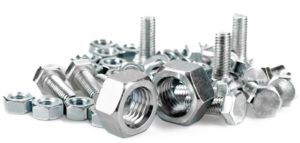 The fastener industry is massive, and understandably so. Employing around 131,949 people, it is responsible for ensuring that anything we construct — buildings, machines, even simple structures like shelving units — stays firmly and reliably together. Owing to the fact that the industry is so large, there are a lot of different options when it comes to choosing a fastener for whatever you’re manufacturing. Here’s an overview of three different types of fasteners you may encounter if you’re looking to build a custom fastener.
The fastener industry is massive, and understandably so. Employing around 131,949 people, it is responsible for ensuring that anything we construct — buildings, machines, even simple structures like shelving units — stays firmly and reliably together. Owing to the fact that the industry is so large, there are a lot of different options when it comes to choosing a fastener for whatever you’re manufacturing. Here’s an overview of three different types of fasteners you may encounter if you’re looking to build a custom fastener.
Check out our EZ Screw Builder to build your custom screw!
- Screws: The most easily recognizable, these fasteners are defined by their threads. They can vary in a seemingly infinite number of ways, from thread and head diameter to overall length. If you’re looking for micro screws, you may need to employ the use of a miniature screw manufacturer as they can be much more difficult to find. Screws are used in nearly every facet of life — furniture, walls, even orthodontics, all employ the use of screws.
- Nuts and Bolts: Bolts also possess threads, but they have an accompanying component (the nut) to ensure the fastener doesn’t come loose and fall out. Bolts come in a wide array of sizes and lengths as well, and their nuts are commonly hexagonal. This allows for easy tightening in uncomfortable spots, such as in a crowded car engine, through the use of a wrench. Nuts and bolts can be found in the industrial manufacturing industry, from vehicles to naval ships, as they provide a more secure and solid fastening.
- Rivets: Rivets don’t really look like they’d be any good at holding two things together, but looks can be deceiving. They’re made up of three parts: a body, a head, and a mandrel. Pop rivets employ the use of a “gun” that tightens the rivet, forcing it deeper inside whatever it’s fastening, until it snaps and creates a clean edge. They are used to fasten fittings to metal surfaces.
There are many different fastener types out there beyond these three; in fact, many of them have a vast subset of specific types and styles underneath these three base forms. Additionally, there are pieces that go with fasteners, such as washers that increase the hold and bearing surface a fastener has. No matter what your business or personal project requires, you’ll be able to find and build a custom fastener — the right custom fastener — to get the job done.
Related Articles
When it comes to product design, every detail matters. From the choice of materials to the manufacturing process, every decision can significantly impact the functionality, durability, and aesthetics of a...
Spending $1500-$3000 on a custom screws may seem excessive to some, but for designers and engineers who are passionate about their craft, it can be a necessary expense to solve...
Tamper proof screws are an important security feature for many industries, including electronics manufacturing, aerospace, and government. They are designed to prevent unauthorized access to sensitive equipment, products, or areas...

 The fastener industry is massive, and understandably so. Employing around 131,949 people, it is responsible for ensuring that anything we construct — buildings, machines, even simple structures like shelving units — stays firmly and reliably together. Owing to the fact that the industry is so large, there are a lot of different options when it comes to choosing a fastener for whatever you’re manufacturing. Here’s an overview of three different types of fasteners you may encounter if you’re looking to
The fastener industry is massive, and understandably so. Employing around 131,949 people, it is responsible for ensuring that anything we construct — buildings, machines, even simple structures like shelving units — stays firmly and reliably together. Owing to the fact that the industry is so large, there are a lot of different options when it comes to choosing a fastener for whatever you’re manufacturing. Here’s an overview of three different types of fasteners you may encounter if you’re looking to